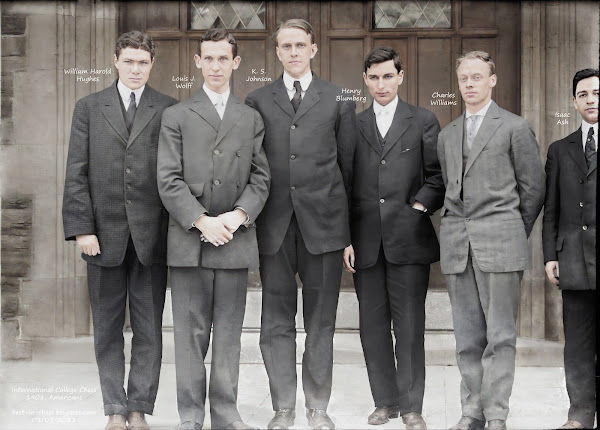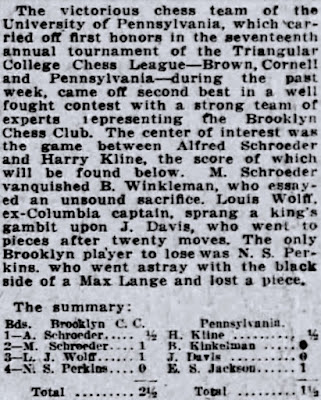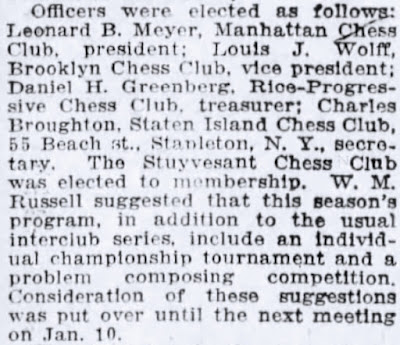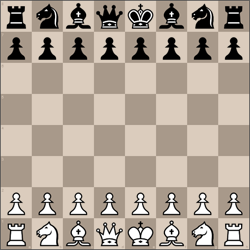Additional Games
Louis J. Wolff
September 20, 1886 - July 1985
1907
The Baltimore Sun, Baltimore, Maryland, Friday, March 15, 1907
Jose R. Capablanca, of Columbia, the youthful Cuban chess wonder, will head the American sextet, playing at the first board. His college mate on the team will be Louis J. Wolff, chess captain for the blue and white. Q. A. Brackett and P. W. Bridgman, or G. T. McClure, will represent Harvard and E. B. Burgess and W. M. Ward will bear the Yale and Princeton colors, respectively. H. Blumberg, of Columbia, has been chosen to act as substitute.
1908
Chicago Tribune, Chicago, Illinois, Sunday, February 16, 1908
CABLE CHESS MATCH ARRANGED
British University Men Accept Challenge of American Players to Contest for Rice Trophy.
New York, Feb 15.—Acceptance of the challenge issued by Capt. Louis Wolff of Columbia university chess team on behalf of that university, Harvard, Yale, Princeton, Cornell, Brown, and Pennsylvania to play for the Rice intercollegiate trophy by cable has been received from N. J. Roughton, president of the Oxford University Chess club, who acts both for his own university and Cambridge. The date, March 21, appears to be acceptable.
The Brooklyn Daily Eagle, Brooklyn, New York, Sunday, February 16, 1908
Brooklyn High Boy A Star Chess Player.
As captain of the Columbia University chess team, member of the intercollegiate quartet and one of the sextet representing Columbia, Harvard, Yale and Princeton in the intercollegiate cable chess match with Oxford and Cambridge, Louis J. Wolff of Brooklyn is probably the most prominent college chess player in the country to-day. In addition he is secretary to the committee having charge of the American end of the big match with the English universities and upon him, therefore, falls the burden of the arrangements which are going forward with all possible dispatch.
Wolff is a graduate of the Brooklyn Boys High School, an institution that has furnished many clever exponents of the game, as witness R. T. Black and E. H. Riedel, Cornell's champion team in the Triangular College Chess League. In entering Columbia, Wolff won one of the Seth Low scholarships, so that he is not permitting the pursuit of chess to interfere with his more serious studies. He is not a native of Brooklyn, but came here at an early age from Cincinnati. The young expert headed the champion team of Columbia University in the last two annual tournaments with Harvard, Princeton and Yale, winning three games straigh on the first occasion and scoring 2½ out of 3 last Christmas. In the collegiate cable match of a year ago. Wolff won his game by means of neat end game tactics. Wolff is a student member of the Brooklyn Chess Club.
 Americans In Lead In Chess Cable Match 22 Mar 1908, Sun The Brooklyn Daily Eagle (Brooklyn, New York) Newspapers.com
Americans In Lead In Chess Cable Match 22 Mar 1908, Sun The Brooklyn Daily Eagle (Brooklyn, New York) Newspapers.com
Americans In Lead In Chess Cable Match.
Have One Point Advantage in Intercollegiate Contest With England.
TWO GAMES STILL UNDECIDED
Louis J. Wolff of Columbia Plays Brilliantly Against Cambridge Opponent—Play by Boards.
Philadelphia, March 21—Bent on winning back the laurels lost by the British chess players in the match of a week ago, the team representing Oxford and Cambridge in London faced the sextet representing Columbia, Harvard, Yale, Princeton, Cornell, Brown and Pennsylvania, in the eighth of the series of intercollegiate contests by cable for the Rice trophy to-day. When play ceased, at 6:30 o'clock this evening, the Americans had the advantage, with a score of 2½ points to 1½, two games remaining unfinished. Thereupon draws were offered to the Britons on the two boards, but the latter declined, preferring that they be adjudicated upon by Referee Walter Penn Shipley of this city. Mr. Shipley would not give his decision on the spot, and stated it might be a week before his opinion was given. The opinion is freely expressed by experts in attendance here to-night that the Americans will retain their lead after the adjudication, and in that way win the match and the trophy.
Louis J. Wolff, captain of the Columbia varsity team, pulled his game out of a very complicated situation, and scored for America, as did C. Williams of Princeton, who found a flaw in the combination of his opponent. W. H. Hughes of Pennsylvania was beaten at the top board by N. J. Roughton of Oxford, K. S. Johnson of Harvard drew his game with B. H. R. Stower of Cambridge, the draw being agreed to at the close of the match.
The match was played from the hall of the Houston Club and the Inns of Court Hotel, the two places being connected by direct commercial cables. Not a hitch occurred the entire day. It was the first time that play on this side has taken place on the campus of a university.
Play began shortly after 8 o'clock in the morning, with the two sextets paired in the following order:
Board 1—W. H. Hughes, Pennsylvania, vs. N. J. Broughton, New College, Oxford.
Board 2—L. J. Wolff, Columbia, vs. L. Illingworth, Trinity College, Cambridge.
Board 3—K. S. Johnson, Harvard, vs. B. H. R. Stower, Queens College, Cambridge.
Board 4—N. Blumberg, Columbia, vs. H. Lob, King's College, Oxford.
Board 5—I. Ash, Pennsylvania, vs. C. G. Woodhouse, Pembroke College, Cambridge.
Board 6—C. Williams, Princeton, vs. R. Petrie, Balliol College, Oxford.
Walter Penn Shipley of this city, umpire for the British collegians, won the toss for move, and elected that Oxford and Cambridge play the white pieces on the odd numbered boards. The Americans, therefore, had the choice of openings on boards 2, 4 and 6. The Ruy Lopez, or Spanish attack, was chosen by the players at the five top boards, but the variations followed were not at all monotonous. At the sixth board, the Englishman resorted to the Petroff defense.
Owing the absence of R. T. Black of Cornell, I. Ash of the University of Pennsylvania, who played in the recent state tournament, was called upon to fill the vacancy.
Wolff of Columbia was pitted against the same player whom he defeated in the match a year ago, and the first seven moves made to-day were identical with those of their game of a year ago. Then it was Illingworth who varied.
Of the Americans who defended the Ruy Lopez, Hughes and Ash both chose the Berlin defense. The former lost some time with his queen's bishop, which retarded his development somewhat, but Ash obtained a satisfactory position from a book line of play. Johnson defended with 5. … P-QR3 defense, and his opponent continued with the steady attack initiated by the advance of the queen's pawn one square. Wolff was met by the 3. … P-QR3 defense, and opened the queen's rook file, but otherwise his adversary established a good position. Blumberg faced the interesting counter attack of 3. … P-B4, from which Lob built up an excellent game. In the Petroff defense at the sixth board, Williams neglected an opportunity of advancing his king's rook pawn on the tenth move with effect, and, as a result, a black knight was entrenched strongly in the Princeton player's field.
Hughes' position went from bad to worse, until finally on the twenty-fifth move Boughton sacrificed a knight in brilliant fashion. The Englishman's rooks and queen obtained access to the black king, and Hughes was forced to resign after twenty-nine moves.
Wolff succeeded in winning his opponent's weak queen's knight's pawn, but, in the end, had to give his king's pawn in return. While Wolff was left with a passed pawn on the queen's wing, Illingworth had a formidable center.
Stower had a passed pawn at K6 against Johnson of Harvard, and the latter did not get a very promising game.
Blumberg castled on the queen's side, exchanging queens on the seventeenth move. He had slightly the better position.
Lively play was witnessed between Woodhouse and Ash, but equality was maintained, although Ash's queen's bishop was out of play.
The misfortunes which befell Hughes was offset at the sixth board, where Williams of Princeton won a piece on the seventeenth move in consequence of an unsound combination made by Petrie.
1916
Evening Star, Washington, District of Columbia, Sunday, January 02, 1916
The victorious chess team of the University of Pennsylvania, which varled off first honors in the seventeenth annual tournament of the Triangular College Chess League—Brown, Cornell nd Pennsylvania?during the past reek, came off second best in a well fought contest with a strong team of experts representing the Brooklyn Chess Club. The center of interest was the game between Alfred Schroeder and Harry Kline, the score of which fill be found below. M. Schroeder vanquished B. Winkleman, who essayed an unsound sacrifice. Louis Wolff, ex-Columbia captain, sprang a king's gambit upon J. Davis, who went to pieces after twenty moves. The only Brooklyn player to lose was N. S. Perkins who went astray with the black side of a Max Lange and lost a piece.
1923
The Brooklyn Daily Eagle, Brooklyn, New York, Thursday, December 13, 1923
Officers were elected as follows: Leonard B. Meyer, Manhattan Chess Club, president; Louis J. Wolff, Brooklyn Chess Club, vice president; Daniel H. Greenberg, Rice-Progressive Chess Club, treasurer; Charles Broughton, Staten Island Chess Club, 55 Beach st., Stapleton, N. Y., secretary. The Stuyvesant Chess Club was elected to membership. W. M. Russell suggested that this season's program, in addition to the usual interclub series, include an individual championship tournament and a problem composing competition. Consideration of these suggestions was put over until the next meeting on Jan. 10.
1924
The Brooklyn Daily Eagle, Brooklyn, New York, Thursday, April 24, 1924
Wolff Takes a Hand.
Louis J. Wolff, whose lively imagination enabled him to score many notable victories in his college days when representing Columbia, once in a while sits down to help out the Brooklyn C. C. team, which he captains. His stock of ideas is by no means exhausted, as will be seen by a perusal of the following neat example of his skill demonstrated at the expense of M. Wilenkin of the champion Stuyvesant team:
Louis J. Wolff (white) vs. M. Wilenkin (black)
Sicilian Defense: Open






























